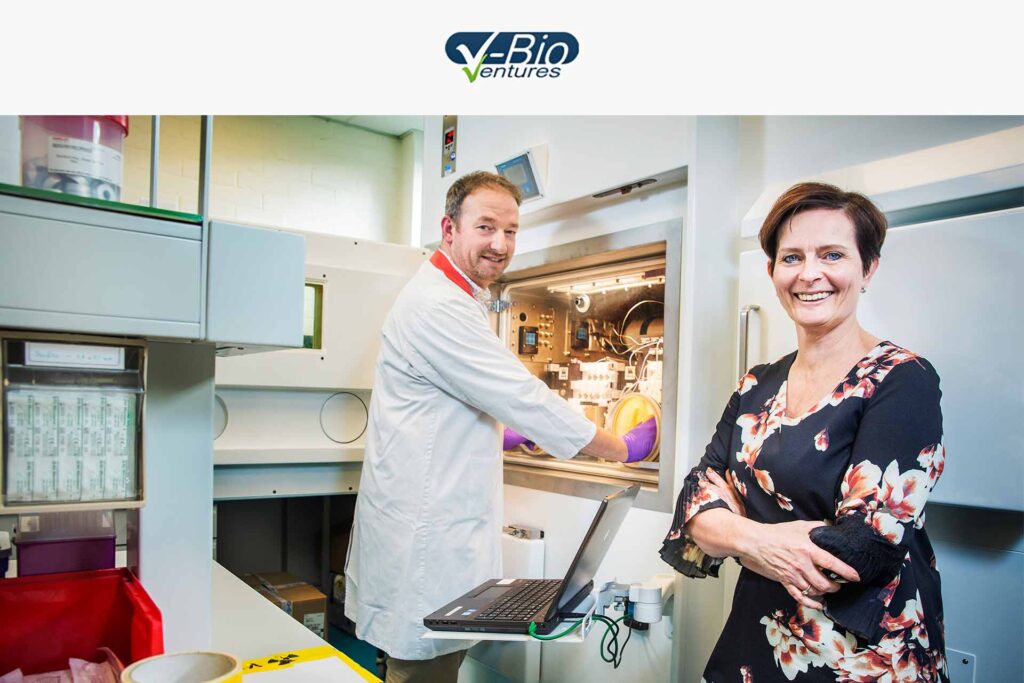

A new drug that can identify tumors, trace metastases, and treat cancer – all in one? Belgian start-up Precirix is aiming high with its lead compound – a precision radiopharmaceutical using camelid antibodies to bind to, and irradiate, cancer cells.
Header image: Precirix CEO Ruth Devenyns with CSO/Co-founder Tony Lahoutte.
Initially launched by a group of VUB scientists as Camel-IDS, CEO Ruth Devenyns joined Precirix in 2017. Under her leadership, the company raised a €37 million Series A in 2018 with V-Bio Ventures as lead investor. Since then, Precirix has been hard at work, setting up clinical trials and perfecting the manufacturing process of their unique drugs. With FDA approval in hand, the company is all set to start treating cancer patients in its Phase I/II study, testing the efficacy of their lead candidate against HER2-positive brain tumors. Devenyns explains what sets the Precirix approach apart, even in the world of radiopharmaceuticals:
“Our company is part of a shift in oncology from classical treatments towards targeted therapies. Radiation therapy has been around for decades, but traditional methods (where the patient receives external beams of radiation) are not always precise and can hurt healthy tissue. At Precirix, we’re developing next-gen systemic radiation therapies: radiation delivered through drugs – radiopharmaceuticals – which are capable of accurately binding to cancer cells and killing them, while leaving healthy tissues alone.”
Targeting tumors with camelid antibodies
Precirix’s drugs consist of three vital components, each equally important: the carrier, which targets and binds to the cancer cells; the radioactive isotope, which kills the tumor; and the linker, which joins the carrier and isotope payload together. The type of carrier used by Precirix is what really sets the company apart: where most companies work with monoclonals or peptides, Precirix’s carriers are single-domain antibodies derived from camelids.
“At Precirix, we’re developing radiopharmaceuticals which are capable of accurately binding to cancer cells and killing them, while leaving healthy tissues alone.” – Ruth Devenyns, Precirix
“An important feature of both single-domain antibodies and full monoclonals is that they’re precise and can be generated against any target of interest. The benefit of single-domain antibodies however, is that they are much smaller than monoclonals, so they also have the features of small molecules: they circulate fast in the bloodstream, meaning they can reach the targeted cancer cells quickly, and whatever fraction of the drug remains unbound is quickly eliminated from the body.”
Diagnostic + Therapy = Theranostic
With the broad targeting potential of their antibodies and a range of radioisotopes, Precirix is building a real platform technology, capable of generating a broad pipeline of products. But the benefits of the approach don’t end there. Radioisotopes, like the iodine in Precirix’s lead candidate, are capable of killing cancer cells through radiation. There is a secondary advantage to working with these radioactive compounds though: they can also be used for medical imaging.
“Our approach is theranostic… This means we can select patients with a bias for treatment success.” – Ruth Devenyns, Precirix
“Our approach is theranostic,” explains Devenyns. “In our clinical studies, we first administer a low dose of our product to patients – the exact same substance as the therapeutic drug. The radioisotopes will fluoresce on a CT scan, meaning we can use our drug to get a visual on the tumor. If we see the cancer lesion light up, then we know that the patient definitely has the type of cancer that our drug has been designed to target. This means we can select patients with a bias for treatment success. Another benefit of this approach is that we can also see if the tumor has metastasized and spread to different parts of the body.”
Beating brain cancer
Precirix’s lead compound has been designed to treat in HER2-positive tumors, a specific cancer type that is particularly common in breast and gastric cancers.
“There are many drugs on the market for HER2 cancers,” Devenyns tells us, “Most of them are full monoclonals or antibody-drug conjugates. These drugs can keep HER2-positive cancers under control for many years, as long as the disease doesn’t progress to the brain. Once a patient develops brain lesions, the drugs become ineffective, because the compounds are simply too large to get through the blood-brain barrier. There are currently no available solutions that can help HER2 patients once the cancer has progressed to this stage.”
As mentioned, one of the differentiating features of single-domain antibodies is their small size. Devenyns is hopeful that Precirix’s lead compound will be able to make a difference to these patients in need:
“Many oncologists tell us: ‘if you can help HER2 patients with brain metastices, then you really have something unique’! Through multiple clinical studies with our academic partners, we have been able to demonstrate that our single-domain antibodies can in fact access these brain lesions.”
“With these single-domain antibodies, we can really go after any target of interest – we have a platform technology with huge potential.” – Ruth Devenyns, Precirix
Confident in the drug’s ability to get on target, Precirix is now conducting Phase I/II trials to evaluate the therapeutic effect of its lead compound. Meanwhile, Devnyns is gearing up for a Series B, aiming to progress several preclinical programs also in the pipeline.
“With these single-domain antibodies, we can really go after any target of interest – we have a platform technology with huge potential. With our strong and highly motivated team, we’re all very eager to see our drugs help patients in need. This is what drives us all!”
